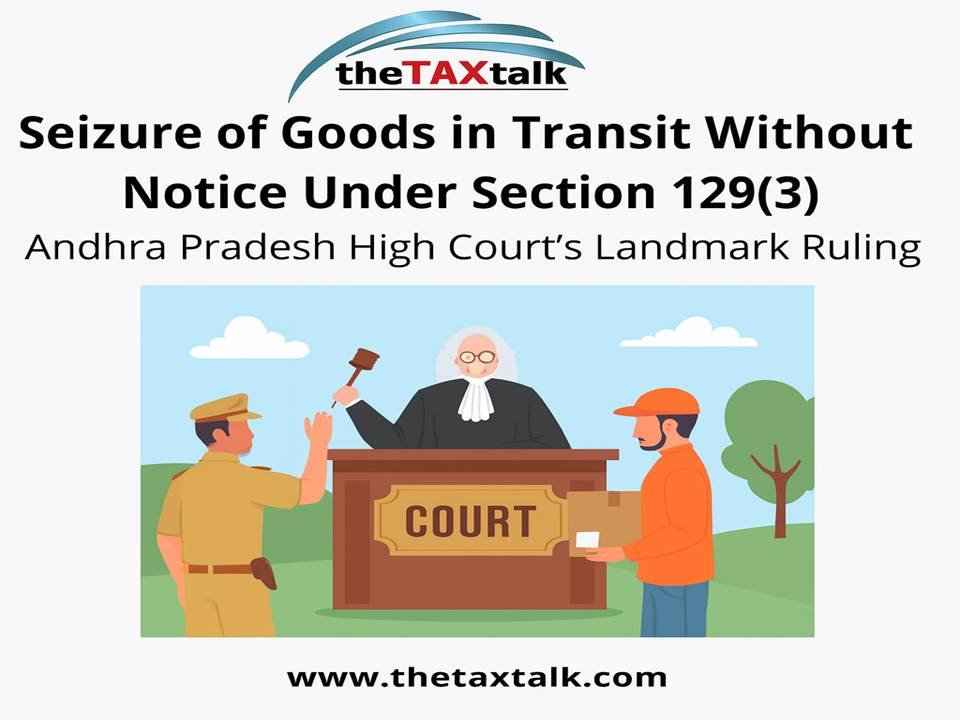![]()
Seizure of Goods in Transit Without Notice Under Section 129(3): Andhra Pradesh High Court’s Landmark Ruling
Introduction
Under the Central Goods and Services Tax (CGST) Act, 2017, the movement of goods in transit is strictly regulated. Sections 129 and 130 deal with detention, seizure, and confiscation. However, taxpayers across India have often faced arbitrary seizures by officials without following due process.
A significant ruling of the Andhra Pradesh High Court in M/s Srinivas Traders v. The Assistant Commissioner of State Tax & Ors. [W.P. Nos. 10881, 10883, 10885, 10961 & 10964 of 2025; decided on 07.05.2025; 2025 (5) TMI 1675] has clarified that seizure of goods in transit without issuing a proper notice under Section 129(3) and without recording clear reasons violates the CGST Act and the principles of natural justice.
Case Background: M/s Srinivas Traders
The facts were straightforward but alarming:
• The taxpayer’s goods were intercepted in transit.
• The seizure memos issued were mere printed formats with tick-boxesand lacked specific reasons.
• Crucially, no notice under Section 129(3)(in Form MOV-07) was issued.
• The Department jumped directly to confiscation proceedings under Section 130, bypassing the valuation and determination process under Section 129.
This prompted the taxpayer to approach the High Court.
Legal Framework – Sections 129 and 130
• Section 129 (Detention, seizure and release of goods and conveyances in transit):
• Requires that goods can be detained/seized only with a notice in Form MOV-07 under Section 129(3).
• Provides for release upon payment of tax and penalty under Section 129(1).
• Ensures due process and opportunity of hearingbefore final determination.
• Section 130 (Confiscation of goods or conveyances and levy of penalty):
• Can be invoked only after a valid initiation under Section 129.
• Direct confiscation without lawful seizure is impermissible.
Court’s Observations
The Andhra Pradesh High Court made several critical findings:
1. Seizure Without Notice Illegal
• Detention or seizure without issuing a proper show cause notice (SCN) under Section 129(3)is ultra vires the CGST Act.
2. Tick-Box Seizure Memos Invalid
• Printed formats with generic tick-marks cannot replace reasoned, speaking orders.
3. Direct Recourse to Section 130 Impermissible
• Officials cannot bypass Section 129 and initiate confiscation under Section 130 directly.
4. Reliance on Mohinder Singh Gill Principle
• Citing (1978) 1 SCC 405, the Court reiterated that reasons must be recorded in the original orderand cannot be supplemented later during litigation.
5. Directions Issued by Court
• Issue proper Section 129(3) notice.
• Fix liability and grant hearing to the taxpayer.
• Release goods under Section 129(1) once conditions are met.
• Train tax officers in lawful seizure procedures.
Author’s Commentary
The ruling underscores several key aspects:
• Issuance of SCN under Section 129(3) is mandatory. Failure to issue Form MOV-07 makes the seizure illegal.
• Confiscation under Section 130 cannot be sustained without valid initiation under Section 129.
• Confiscation without lawful seizure is void.
• However, by permitting the Department to issue a fresh SCN, the Court somewhat diluted the principle of finality. This prolongs litigation and burdens taxpayers for departmental lapses.
Why This Ruling Matters
This judgment is significant for transporters, traders, logistics companies, and manufacturers, as it reaffirms:
• Due process must be followedin every seizure.
• Arbitrary actions are subject to judicial review.
• Taxpayers should not suffer for procedural lapses of tax officials.
• The principles of natural justice– audi alteram partem (hear the other side) and non-arbitrariness – remain the backbone of GST enforcement.
Practical Takeaways for Businesses
To safeguard against arbitrary seizure:
1. Ensure proper e-way bills and invoicesaccompany goods in transit.
2. If seized, insist on a written notice in Form MOV-07under Section 129(3).
3. Challenge vague or tick-box seizure memos as invalid.
4. Keep records of goods, payments, and correspondence for defence.
5. Escalate violations of natural justice to higher forums, citing this judgment.
Conclusion
The Andhra Pradesh High Court in Srinivas Traders has drawn a clear line: Seizure of goods in transit without notice under Section 129(3) and without recording reasons is illegal. Direct confiscation under Section 130, bypassing due process, cannot stand.
This ruling is a wake-up call for the GST Department and a shield of protection for taxpayers. While the allowance of a fresh SCN may extend litigation, the core message is unambiguous – natural justice is non-negotiable under GST.
Case Citation: M/s Srinivas Traders v. The Assistant Commissioner of State Tax & Ors., W.P. Nos. 10881, 10883, 10885, 10961 & 10964 of 2025, decided on 07.05.2025, 2025 (5) TMI 1675 – Andhra Pradesh High Court.
The copy of the order is as under:


